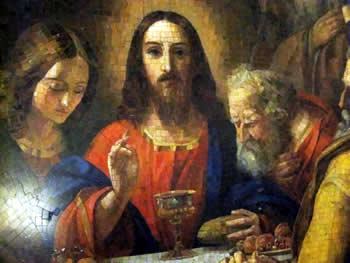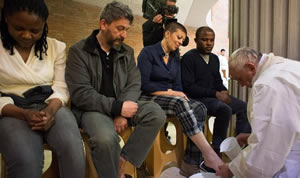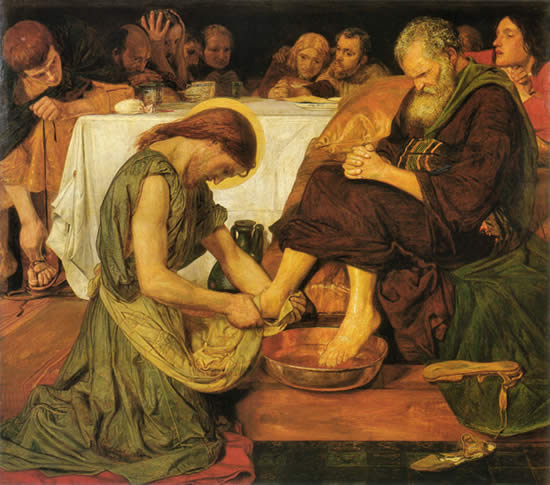
In the interest of full disclosure: The stimulus for this reflection came from a conversation last Spring with
my friend and a deaconIn many protestant denominations, a "deacon" is an elected (by the
local congregation) lay person with responsibilities centering around providing for the human needs of the church
family (usually as a part of a Board of Deacons). In the Anglican churches, as well as some others, a deacon is considered
a part of the clergy. Deacon is an ordained position the result of both course work and intern-type experiences. Although
full clergy, these deacons are not permitted to preside at the Eucharist, nor can they bless people or absolve sins. In terms of
worship they may set up the altar for Eucharist and usually read the gospel.
There are two types of these ordained
deacons, and training and responsibilities are similar. For Transitional deacons the position is considered
a step to becoming a priest. Vocational deacons are individuals ordained with the intent of staying in the order rather
than seeking the priesthood. Such deacons often have secular careers. Many vocational deacons have careers in the social services,
where they can manifest their particular ministry of care and outreach. Jeff Moretzsohn is this latter-type deacon on our Church
of the Good Samaritan, in Paoli, Pennsylvania. As such, Jeff is the clergy person responsible for our many outreach programs, as
well as a minister to the ill and needy.
in our church, Jeff Moretzsohn. In our discussion, Deacon Jeff shared his preliminary thoughts for a homily he would deliver
at an upcoming Maundy Thursday service. (See video of that homily in Resources below.)
Holy Week, the week just before Easter (sometimes called Passion Week) is an important period in the Christian calendar. The Thursday of that week is particularly special and called Maundy Thursday. (It may also be called: "Holy Thursday", "Covenant Thursday", "Great and Holy Thursday", "Thursday of Mysteries", and "Sheer Thursday".)
Whatever the name, most Christians associate this special Thursday with the Last Supper of Jesus and his disciples ... in the Upper Room. It would be a rare Maundy Thursday service where Holy Communion was not the focus. In scripture, details vary, but all four gospels record this special night. In the three Synoptic Gospels (Matthew, Mark, and Luke), the Last Supper was held on the feast of Passover. According to the Gospel of John, however, Jesus has his last supper on a date in the Hebrew calendar, Nisan 14, which is the night before the first night of Passover.(See: Matthew 26:17-30, Mark 14:12-26, Luke 22:1-20, and John 13:1 - 17:26.)
In sharing his thoughts about Maundy Thursday – which he called his favorite of all the year's services – Jeff said that the Holy Communion of Jesus breaking the bread and sharing the wine was not the only important event that night in the Upper Room. Although very important and the event that has become the lasting tradition, he pointed out that there were two other components of the night that were just as important, but that in his opinion, do not have their rightful place in the church nor have the impact they deserve.
Jeff explained: In addition to the Holy Meal, Jesus also gave a New Command: "Love one another. As I have loved you, so you must love one another." (John 13:34) Imagine, Jeff wondered, what church might be like if we gave this command a status similar to what we do with communion. We make all sorts of rules about communion: who can partake, how often we observe it, and so forth, often in ways that divide rather than unify us. I added, too, that we ascribe all sorts of additional meaning to Jesus' simple words, "Do this in remembrance of me." But, with this command (which may be the only direction Jesus actually called a command), the words can become only a warm saying; do we really emphasize loving one another as Jesus loved us? Ever hear of someone being called before a church council because they did not show love to the neighbor down the street?
Interestingly, some in earlier times did recognize the "command" nature of Jesus' words. Some scholars think the "Maundy" in Maundy Thursday is derived through Middle English and Old French mandé, from the Latin "Mandatum" (Order). It is first word of the phrase "Mandatum novum do vobis ut diligatis invicem sicut dilexi vos," which is this New Command Jesus gives on that night.Other scholars theorize that the English name "Maundy Thursday" arose from "maundsor baskets" or "maundy purses" of alms which the king of England distributed to certain poor at Whitehall before attending Mass on that day. Thus, "maund" is connected to the Latin mendicare, and French mendier, to beg.
Jeff pointed out that a third key Maundy Thursday event is Jesus Washes the Disciple's Feet. In a way, Jesus ties his New Command to this foot-washing by showing that one way to love one another, "as I have loved you," is through this stooping as a servant to wash the others' feet. While we've elevated the evening's Holy Communion to a most high and institutionalized status, the same evening's foot-washing, as with The Command, seems to remain just a somewhat-odd, messy ritual we might do once a year. Does it deserve more? What might our churches be like if we emphasized foot-washing even a tenth as much as we emphasize communion?

That same day, the pope celebrated Mass in the prison's chapel. One of the altar servers at this Mass was a man convicted of multiple homicides. In his homily, the Pope told inmates that since slaves washed the feet of their masters in Biblical times, the event symbolized service to others and spiritual cleansing. He told them that he too needed personal cleansing and wanted "to become more of a slave in the service of people".
Sometimes, however, foot-washing does break into our consciousness in dramatic ways and illustrates this "be a servant" attitude Jesus speaks of. We have probably seen pictures recently of Pope Francis washing the feet of others. In doing so, this pope went beyond what was typical (the pope washing the feet of church leaders ... almost always men) to include women, convicts, the homeless, and even a Muslim woman in one group. (Such inclusion upset many conservative Catholics.) (The PBS News Hour recently aired the story of former apartheid leader in South Africa. He now seeks forgiveness from the many he oppressed by reaching out to blacks. Part of his attempt at atonement is to wash the feet of people he had raged against. See the brief story in the Resources below.)
Thinking later about Deacon Jeff's Three Maundy Things, I thought of a fourth thing. In John's version, he includes a long discourse where he prays for his disciples and those who believe in the disciples' message. In that passage, Jesus prays: "that all of them may be one, Father, just as you are in me and I am in you." (John 17:21) In addition to the holy meal, the new command, and the foot-washing, there is this important prayer that Jesus' followers (including us) be one. I imagine all would agree that we haven't raised this fourth Maundy Thursday component to any level approaching that of communion. With all the divisions within Christianity, we surely are not one. As folks talk about faith issues, it seems there is even little desire to try to be one.
I wondered, and still wonder, about this fuller view of the Maundy Thursday events. Of all that was taught taught and happened that night, why is it that the Holy Communion has been the only thing so elevated and institutionalized? Maybe I'm looking only within myself, but I wonder whether it is because Holy Communion requires little of us — we mainly receive. Oh, we do have to say Yes to the invitation, and we have to come forward. But doing so takes little of the effort it takes to stoop and wash another's feet. Or the effort and attitude it takes to reach out and love as Jesus first loved. Or to work at dialogue with others so we might at least approach "being one." I wonder.
Last Spring, I thought Jeff's Maundy Thursday observations were profound and maybe our discussion unique. But recently, I learned that we weren't the only ones who had such thoughts about the scope of Maundy Thursday.
While working on a first draft of this Reflection, I was reading a book (one I'd highly recommend), by a Jesuit, Fr James Martin, a writer I've quoted before. The book is Jesus: A Pilgrimage,Jesus: A Pilgrimage, ©2014 by James Martin. SJ. HarperCollins Publisher. which tells the story of and his reflections about a visit to the Holy Lands. Skimming ahead a bit after reading an early section, I saw a chapter about the Upper Room. These words caught my eye: "The Washing of the Feet? What about the Last Supper, the institution of the Eucharist, which is more important? ... The longer I live the more I wonder how different the Church would be if we spent as much time thinking about the Washing of the Feet as we do about Transubstantiation."Ibid., p. 343. I couldn't wait to get to that part! It sounded so much like our conversation last spring.
In the Resources below, I've included a link to an excerpt of Martin's narrative about the washing of the feet and its importance ... and what the state of the church might be like if we gave it even a bit of the status we give communion. It expands some of the thoughts expressed here and worth a read. (Bonus points if you read it!)
I hope none of my emphasis on other components of Maundy Thursday suggests that I think we should reduce the importance of Communion/Eucharist. For me, the Eucharist is the heart of our worship service and most meaningful. I grew up in the Disciples of Christ (Christian) denomination. Although an ordinance, not a sacrament, communion was a part of the church service each week. Along with Believer's Baptism (by immersion), communion each week is one of the defining traits of the denomination.
Although I treasure the many years later when I was an American Baptist, I missed the weekly celebration of Holy Communion (once a month). A special part now of being in the Anglican community is my return to the weekly (and sometimes more often) celebration of the Eucharist. (In the Resources below, newly elected Bishop Michael Currey, talks about the importance of the Eucharist to him. I ... and I'm sure many others ... can identify with his comments about this sacrament.)
I hope during Holy Week you'll be able to attend a Maundy Thursday service. If you take communion, do so as Jesus commanded: "In remembrance of me." If there is a foot-washing ritual, even though it may seem odd and uncomfortable, try to participate. Remember, Jesus started the tradition. It also represents an example of what he means when he commands us to love one another as he has loved us.
And after all these events in the Upper Room: "When they had sung a hymn, they went out to the Mount of Olives." (Mark 14:26)

Resources Related To this Reflection
 What If We Celebrated the Foot-Washing?
What If We Celebrated the Foot-Washing?An excerpt from Fr James Martin's Jesus: A Pilgrimage as referenced above.
 Maundy Thursday Homily
Maundy Thursday HomilyA video of Deacon Jeff Moretzsohn's homily at Maundy Thursday service, April 2, 2015. (About 20 minutes.)
 Bishop Michael Curry: Eucharist
Bishop Michael Curry: EucharistA short video by U.S Presiding Bishop (Episcopalian) expresses what the Eucharist means to him. (Produced prior to his becoming U.S. Bishop.)
 Adriaan Vlok Seeks Forgiveness
Adriaan Vlok Seeks ForgivenessA short PBS News Hour segment: Adriaan Vlok, an oppressor of blacks in South Africa tries to reconcile through involvement and washing of feet. (2/17/16)





